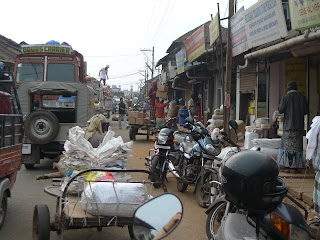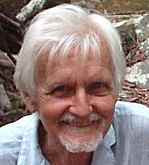The local people use honey to sweeten almost everything, including the water they drink. Here are the hives for the bees from which they collect the honey. These hives, as can be seen are less than half the size of those used in the western countries.
This is the small hand operated extractor which is used to extract the honey from the comb. The use of this machine is shared amongst a number of the villagers, as for them not only is this the most cost effective way of doing things given that no one has a great deal of money, it is also the most practical.
In places that cater for both the local culture and the western culture, it is interesting to see the development of toilets which cater for both. For in the past, and of course still is for the majority of the people of India, squat toilets, or just digging a hole in the ground, or in some instances, not even that, was/is the norm. As can be seen this toilet enables both methods to be utilised.
Large retal stores similar to those we see in the West are becoming more and more common in India, although surprising at it may seem, they do not open for business until 11am. On the other hand they do not close till 10pm either. For it is not until later in the day, and night, that the people of India are most active. This security guard has headgear and sash remniscent of the days of the Raj.
Bhante U Dhammanda, a Buddhist monk from Malaysia, was also visiting the area, and somewhat the same places, and meeting with the same people. He has invited me to visit Malaysia next year to speak to their people. If I am to take up all the invitations to speak, I will have very little time for the farm. Each will need to take their turn so it appears.
This is one of the attentive groups that I addressed whilst in Kerala, India. If necessary they would sit for hours to hear something new, and/or different
At these gatherings we were often given bouquets of flowers, amongst other things, as a showing of their gratitude for the lecture. One Westerner commented on how unusual this was for flowers to be offered to to a Westerner as in the Western society they only be offered to a woman. In reality it is a delightful custom, particularly as the people are so poor, and the flowers are virtually free for them to offer as a token of their esteem and does not represent a hardship either on the giver or the recipient.
This is one of the more opulent homes we spent the night in It belonged to a retired teacher of French, and was in a very beautiful setting surrounded by mostly cocoanut palms, bananas and other tropical plants
On this property was to be found a very rare type of cocoanut tree the name of which I unfortunately did not record at the time.
This is a part of the old original dwelling which is now occupied by the oxen
The beautifully Hand carved doors and interior motifs in the home were a delight to see in this day and age where such things are not only a rarity in Western society, are rarely if ever seen.
 |
| Lounge Room |
 |
| Interior staircase |
A very homely and delightful place to spend the night, as well as having a most gracious person as a host. It was far superior to spending one's time in the best of hotels I can assure you



































